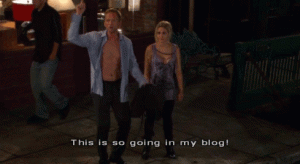First of all, yes. The title of this post quoted Barney, from How I Met Your Mother. And yes, you’re welcome.
My impression of blogging stemmed largely from this show; a place for individuals to complain, brag, recount their days (now that I think about it, a less concise version of twitter.) That being said, blogging can be engaging, well written, and well designed with just a bit of thought behind them.
In my experience, the blogs that I have found most successful have a few key points in common.
- They are engaging on multiple levels. While compelling writing is imperative to a word-based blog, visual engagement is crucial to a blogs success. Think about it; if a 5-star meal in the finest restaurant in Paris comes out looking like your dogs bad reaction to medicine, and you’re going to get it out of your sight. Blogs are no different. First impressions are lasting, and the appearance of a blog is the first opportunity for judgement on the part of the reader. (To be fair, that analogy isn’t exact. I’ve never seen a blog that outrageous in appearance, but I’m getting the point across, right?)
- They are both engaged with and respectful of their audience. As digital media scholar Brian Carroll wrote, “When you get comments, react to them. Encourage them. Affirm your readers and continue the conversations your posts have begun” (163.) Blogs represent a unique opportunity for consumers to become producers and vice versa, where those who write blogs can accept and engage with comments and criticism from readers. Providing space for readers to engage with the material, especially given the standard personal opinion that litters blog posts, is crucial to the community that blogging creates. On the same level, community is impossible when blogs ignore some basic ethics of publishing online. Carroll notes that of these ethics, stating the difference between fact and speculation, linking to referenced material, and correcting mistakes are key to maintaining ethical standards. Respecting the community involves respecting those ethics. To ignore them is to disrespect the reader, plain and simple.
- Lastly, their writing is organic. By organic, I borrow from Pete Rorabaugh’s definition of organic writing insofar as that it develops in often different ways than it might have been originally intended (2). When writing is as personal as many blogs tend to be, E.M. Foster’s quote “How can I know what I think until I see what I say?” comes to mind. Organic writing is a process, and in blogs, could develop over multiple posts through both the writing of the author and the contributions of the community.
Now, it isn’t perfect, but I often turn to the travel blog The Bucket List Family for a good example of blog writing. On the negative side, it doesn’t leave space for public comment. That being said, it’s visually stunning, rightly transparent, and provides space for public engagement with the authors, always keeping me coming back to hear their travel updates and tips.
That, however, is just me. Maybe you’d read Barney Stinson’s blog despite it’s mundane appearance. What keeps you coming back?
